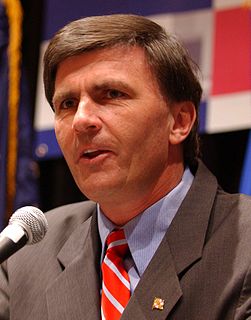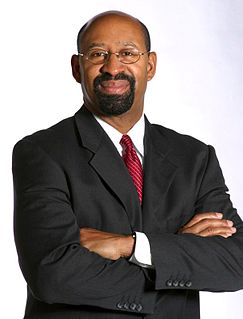A Quote by Nina Turner
In terms of President Trump, I really do hope that he does accomplish some of the things he said on the campaign trail. If he is willing to make investments in infrastructure, but not on the backs of the middle class and the working class, and put people back to work, that would be a good thing. If he's serious about making Obamacare better, and not pulling the rug out from 20 million Americans who benefit from it, that would be a good thing too.
Quote Topics
About
Accomplish
Back
Back To Work
Backs
Benefit
Better
Campaign
Class
Does
Good
Good Thing
Hope
Infrastructure
Investments
Make
Making
Middle
Middle Class
Million
Obamacare
Out
People
President
President Trump
Pulling
Put
Really
Rug
Said
Serious
Some
Terms
Thing
Things
Too
Trail
Trump
Willing
Work
Working
Working Class
Would
Would Be
Related Quotes
This is one way that wealthy Americans could really contribute. They could put hundreds of millions of dollars into the infrastructure bank, be a good investment for them, for their children, for their grandchildren, and they would directly contribute to revitalizing a big sector of middle-class wages in America and making our country more productive, so that we could create more opportunity. But I think that we could get a lot of grassroots support from, like, local chambers of commerce and other things if they understood exactly how this infrastructure bank would work.
I believed in a good home, in sane and sound living, in good food, good times, work, faith and hope. I have always believed in these things. It was with some amazement that I realized I was one of the few people in the world who really believed in these things without going around making a dull middle class philosophy out of it. I was suddenly left with nothing in my hands but a handful of crazy stars.
The problem or the fundamental flaw of Obamacare was that they put regulations on the insurance, about 12 regulations, which increased the cost of the insurance. And so President Obama wanted to help poor, working-class people, but he actually hurts them by making the insurance too expensive to want to buy. I had someone at the house just recently was doing some work, and he said: "Oh, my son doesn't have insurance, he's paying the penalty because it's too expensive."
The light bulb going off in my head was a fear that in this pivotal moment in history, when America faces so many serious problems, when the middle class and working class of this country are being decimated, that there were not voices out there representing the tens of millions of people who needed a voice. And the idea of going through a campaign where there is not a serious discussion about the most important issues facing America, where there are not voices out there representing people who are hurting - that seemed to me unacceptable.
I think a good painting or a good work of art does many things it wants, I mean, maybe 15 or 20 or 100. One of the things a painting does is to make the room look better. It improves the wall that it's on. Which is much harder than it looks. And that's a good thing. And if one engages with a painting on that level, that's fine, that's great. After some time, familiarity, the other things that a painting does, the other layers, they just start to make themselves felt.
When the president talks about tax reform, he talks about the people who will benefit. He talks about American jobs. He talks about the fact that we're going to be taking money that's overseas and bringing it back to the United States so that it will employ American workers. I think that focus again on the American working and middle class is- is-is to me the most thoughtful and, in some ways, the most genius part of Trump's approach to politics.
We've got to make sure that we rebuild the infrastructure in America, because we used to be - have the best bridges, the best roads, the best airports. And now, when you go to China or you go to Europe, you see that they are outstripping us in terms of infrastructure. And if we put people back to work, that would be good not only in the short term, but it would also lay the foundation, the framework for long-term economic and job growth.
What sense would it make to classify a man as handicapped because he is in a wheelchair today, if he is expected to be walking again in a month, and competing in track meets before the year is out? Yet Americans are generally given 'class' labels on the basis of their transient location in the income stream. If most Americans do not stay in the same broad income bracket for even a decade, their repeatedly changing 'class' makes class itself a nebulous concept. Yet the intelligentsia are habituated, if not addicted, to seeing the world in class terms.
Independent experts have looked at what I've proposed and looked at what Donald's [Trump] proposed, and basically they've said this, that if his tax plan, which would blow up the debt by over $5 trillion and would in some instances disadvantage middle-class families compared to the wealthy, were to go into effect, we would lose 3.5 million jobs and maybe have another recession.































